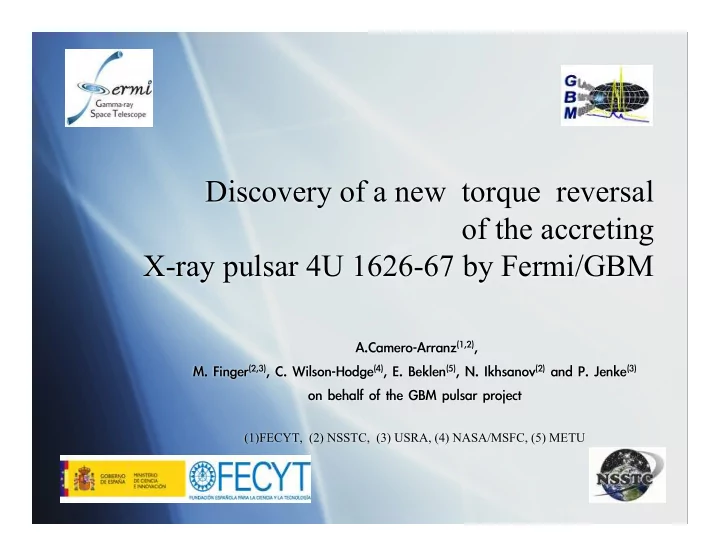

Discovery of a new torque reversal of the accreting X-ray pulsar 4U 1626-67 by Fermi/GBM A.Camero-Arranz (1,2) , M. Finger (2,3) , C. Wilson-Hodge (4) , E. Beklen (5) , N. Ikhsanov (2) and P. Jenke (3) on behalf of the GBM pulsar project (1)FECYT, (2) NSSTC, (3) USRA, (4) NASA/MSFC, (5) METU
The GBM pulsar project Motivation To continuously monitor the full sky for accreting X-ray pulsars with spin frequencies in the 1 mHz to 2 Hz range. This monitoring system has two components: 1) daily blind search for pulsed sources, and 2) monitoring known sources, e.g. 4U 1626-67 2009 Fermi Symposium 2-5 November Washington
4U 1626-67 The Fermi/Gamma-ray Burst Monitor (GBM) GBM : 12 Sodium Iodide (NaI) and 2 Bismuth Germanate (BGO) scintillation detectors Energy range: NaI det: ~8 keV to 1 MeV BGO det: 200 keV to 40MeV. Observations: - (GBM) NaI detectors CTIME data (0.256 s time bins, and 8 energy channels). - Our analysis: channels 1 (11.7-26.8 keV) and 2 (26.8-50.3 keV). 2009 Fermi Symposium 2-5 November Washington
Accreting X-ray pulsars Introduction ACCRETION PROCESS X-ray Pulsations 2009 Fermi Symposium 2-5 November Washington
4U 1626-67 Introduction What do we know about 4U 1626-67? . LMXRB 1977 1990 2004 . P pulse = 7.66 s . Ultracompact 42 min orbit . Optical counterpart: KZ TrA , V~17.5 (strong UV excess and high optical pulse fraction) . 48 mHz quasi-periodic oscillation (QPO) Uhuru . ~37 keV absorption cyclotron feature . B= (2.4-6.3)x10 12 G . Distance 5-13 kpc 2009 Fermi Symposium 2-5 November Washington
4U 1626-67 Timing results NEW TORQUE REVERSAL AND SPIN-UP OF THE ACCRETING X-RAY PULSAR 4U 1626-67 (submitted to ApJ; Atel #2099 ) GBM 2009 Fermi Symposium 2-5 November Washington
4U 1626-67 Timing results NEW TORQUE REVERSAL AND SPIN-UP OF THE ACCRETING X-RAY PULSAR 4U 1626-67 (submitted to ApJ; Atel #2099 ) GBM Swift/BAT Torque reversal centered in 2008 Feb 4 lasting ~150 days 2009 Fermi Symposium 2-5 November Washington
4U 1626-67 Timing results Spin-up rate Almost identical d µ /dt = ±5x10 13 Hz/s spin up rates before and after the reversal BAT count rate Count rate increment a factor of 2.5 Time (MJD) Spin-up rate Strong torque-luminosity correlation, only during the torque reversal (green squares). BAT count rate 2009 Fermi Symposium 2-5 November Washington
4U 1626-67 Spectral analysis Long-term X-ray flux history HR-intensity diagram (relative to HEAO 1) - Same physical mechanism operating Spectral transition from hard to soft during the torque reversal in 1990 and 2008 reversals? same flux values for both transitions 2009 Fermi Symposium 2-5 November Washington
4U 1626-67 Spectral analysis Long-term X-ray flux history HR-intensity diagram (relative to HEAO 1) Spectral transition from hard to - Different flux values ? soft during the torque reversal - Models fail to reproduce these observations 2009 Fermi Symposium 2-5 November Washington
4U 1626-67 Timing-Spectral results During the spin down period there appears to be a torque-luminosity ANTIcorrelation The NS spins faster as it approaches torque reversal, BUT the flux decreases !! 2009 Fermi Symposium 2-5 November Washington
Summary and conclusions • After about 18 years of steadily spinning down 4U1626-67 experienced a new torque reversal. • It becomes difficult to reconcile theoretical models with these recent observations: 1) The spin-up and spin-down torques were again almost identical before and after the transition. 2) It lasted ~150 days (centered on 2008 Feb 4). 3) During the spin down period (from 1990 to 2008), the spin-up rate was increasing while the flux decreased. 4) Only during the reversal we found a strong torque-luminosity correlation. 5) The X-ray flux values from the 1990 June and the 2008 Feb torque reversals are different. 6) The spectrum during the transition is the hardest. 2009 Fermi Symposium 2-5 November Washington
Summary and conclusions • After about 18 years of steadily spinning down 4U1626-67 experienced a new torque reversal. • It becomes difficult to reconcile theoretical models with these recent observations: 1) The spin-up and spin-down torques were again almost identical before and after the transition. 2) It lasted ~150 days (centered on 2008 Feb 4). 3) During the spin down period (from 1990 to 2008), the spin-up rate was increasing while the flux decreased. 4) Only during the reversal we found a strong correlation torque-luminosity. 5) The X-ray flux values from the 1990 June and the 2008 Feb torque reversals are different. 6) The spectrum is harder during the torque transition than before or after. Today the GBM pulsar project has detected 17 accreting X-ray pulsars and is currently monitoring historical transients, including 4U 1626-67 (more info: Mark Finger’s talk). 2009 Fermi Symposium 2-5 November Washington
Recommend
More recommend